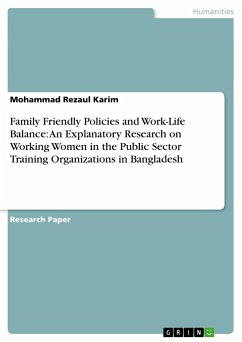
Are Familiy Friendly Policies (FFP) a challenge for organisational structures or just a 'play around the margins'?

PAYBACK Punkte
0 °P sammeln!
Essay from the year 2012 in the subject Sociology - Gender Studies, grade: 1, Heriot-Watt University Edinburgh (School of Language and Management), language: English, abstract: Erstwhile, men were considered as the family breadwinners and women as the homemakers. These assumptions were deep seated and were still considered as apposite even some decades ago (Allard, Haas and Hwang, 2011) and were fostered by renowned scholars that found that work and family life could be regarded as separate spheres (Kanter, 1977). Yet, it is widely accepted that work and family life influence each other in bot...
Essay from the year 2012 in the subject Sociology - Gender Studies, grade: 1, Heriot-Watt University Edinburgh (School of Language and Management), language: English, abstract: Erstwhile, men were considered as the family breadwinners and women as the homemakers. These assumptions were deep seated and were still considered as apposite even some decades ago (Allard, Haas and Hwang, 2011) and were fostered by renowned scholars that found that work and family life could be regarded as separate spheres (Kanter, 1977). Yet, it is widely accepted that work and family life influence each other in both directions (Frone, Russell and Cooper, 1992), that spill over happens between the spheres (Boles, Johnston and Hair, 1997), and that the spheres either overlap or interact with each other (Barnett, 1999). Moreover, the research to date has tended to focus on the mothers and fathers having the same requirements to balance their work and family needs in their daily lives (Van der Lippe, Jager and Kops, 2006). Although, there have been seen substantial changes in gender equality on the labour market, there is still a gender gap prevailing in wages and women's representation in positions with responsibility (Vandeweyer and Glorieux, 2008; Wilton and Purcell, 2010). Albeit, men perform more housework and childcare than they did in the past, the dispersal of paid and unpaid work is still strongly genderbased (Gershuny, Bittman and Brice, 2005; Sayer, 2005). Further, men tend to work longer hours, have more prestigious positions in companies and earn more money than women do which leads to the result that men and women have different economicopportunities and constraints (Wilton, 2007).













